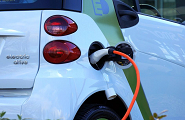Analysis

August 5, 2021
President Biden, Automakers Call for 40-50% EV Sales By 2030
Written by David Schollaert
The Biden administration is calling for mass adoption of electric vehicles (EVs) by 2030, a target supported by major U.S. automakers such as General Motors, Ford and Stellantis. The goal, reinforced with an executive order from the president, bolsters the U.S. auto industry’s efforts to reach a 40-50% EV penetration within the next nine years.
Ford and Stellantis have already confirmed goals for at least 40% EVs by the end of the decade, while GM earlier this year announced its ambition to exclusively offer all-electric and fuel-cell vehicles by 2035.
“Today, Ford, GM and Stellantis announce their shared aspiration to achieve sales of 40-50% of annual U.S. volumes of electric vehicles (battery electric, fuel cell and plug-in hybrid vehicles) by 2030 in order to move the nation closer to a zero-emissions future consistent with Paris climate goals,” according to a joint statement from the three automakers. “This represents a dramatic shift from the U.S. market today that can be achieved only with the timely deployment of the full suite of electrification policies committed to by the administration in the Build Back Better Plan, including purchase incentives, a comprehensive charging network of sufficient density to support the millions of vehicles these targets represent, investments in R&D, and incentives to expand the electric vehicle manufacturing and supply chains in the United States.”
American Iron and Steel Institute President and CEO Kevin Dempsey confirmed his support of the efforts being made by U.S. automakers and the Biden administration. “AISI welcomes today’s executive order from President Biden proposing that by 2030 half of all new vehicle sales will be zero-emissions vehicles, primarily electric cars and trucks. This important goal, coupled with the greenhouse gas vehicle tailpipe standards expected to be proposed soon, will add further momentum to the transformation of the auto sector in the United States.”
Dempsey added that the domestic steel industry is prepared to support U.S. automakers in this endeavor by continuing to innovate and create high-strength, lightweight steels. “These thinner advanced grades of steel enable optimization of space allowing for packaging of more batteries in these vehicles, which means greater range on a single charge. The use of American-made steel, which is the cleanest in the world, will be key in the transition to EVs.”
Automakers BMW, Volvo, Honda and Volkswagen, which have a strong presence in the domestic market, praised California in a joint statement for laying the foundation for Biden’s climate initiatives. California leads other states in its efforts to regulate vehicle emissions, among other “green” initiatives.
“While the California framework companies are driving towards 40-50% of our sales being EVs in the next nine years, bold action from our partners in the federal government is crucial to build consumer demand for electric vehicles and put us on track to achieve the global commitments of the Paris Climate Agreement,” the companies said.
By David Schollaert, David@SteelMarketUpdate.com







